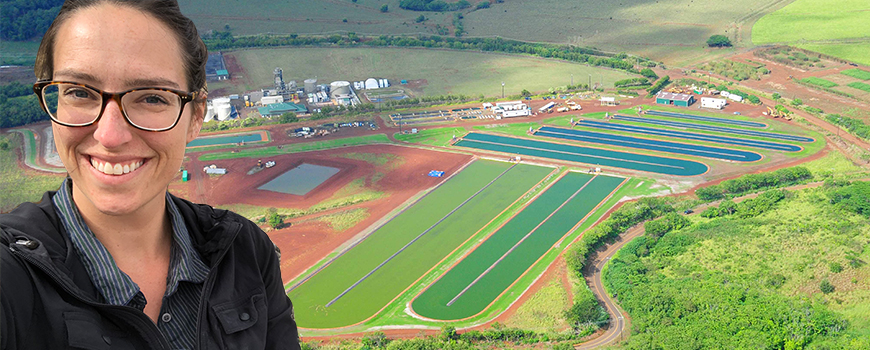
Q: Tell us a little bit about the long-term implications of the work you do and/or the goals you hope to achieve with it in the future. JT: As a team member of Global Algae, I have big goals: I truly believe that we can change the world through the development of large-scale algae production. The vision of Global Algae is to harness the unparalleled productivity of algae to provide food and fuel for the world, dramatically improving the environment, economy, and quality of life for all people. While the potential of algae cultivation is immense and the industry and technology have made significant strides, there is still a lot of work to be done to be in order to produce on a scale that can drive global change.
In looking long-term, I hope to communicate to the broader audience that large scale production of algae is a solution to many environmental and societal problems. Ultimately, I want to play an active role in development of the technology, scaling up, and commercialization of algae production so that it can be a sustainable solution for the future.
Q: What do you love about your job? JT: Since I work for a small business, I get the opportunity to wear many hats. It was important for me after receiving my PhD to gain experience on the business side of the algae industry and expand my understanding of the algae production process, as it is a highly interdisciplinary field. I love that one day I find myself in the lab isolating a new species of algae and another day planning a large networking event to discuss the state of algae as a global food and feed platform. It keeps my job interesting, where I’m constantly learning and challenging myself.
Q: What initially sparked your interest in science and what set you on your path to studying algal biofuels? JT: When I first found a love for science, I was in seventh-grade dissecting a frog. From there, I became interested in microbiology, and the fascinating world on the microscale. In college, I knew I wanted to do something related to applied microbiology—the fact that we can use microbes, something so small, to solve such large problems really resonated with me. In my senior year of college at UC San Diego, I was fortunate enough to get introduced to Dr. Mark Hildebrand from Scripps, who had recently received funding to investigate the use of microalgae for biofuel production.
Algae for the use of food and fuel has the potential to solve many of our current global crises. The moment I learned more about this field and the potential implications I was hooked.

Q: What is one thing you learned at Scripps that has stayed with you to the present day? JT: As a result of the collaborative nature of my doctorate work, I was able to develop communication skills that have been so valuable in my current position. Of course, the technical insight I gained has direct application in my current position, but just as important are the professional skills I acquired as an early career scientist at Scripps. Lessons related to project management, critical analysis, building a network, and public science communication – skills I wouldn’t immediately think to put on a CV – were developed while at Scripps and are utilized every day in my current position.
Q: Are there any role models or mentors who have helped you along the way? JT: Part of what makes Scripps Institution of Oceanography so great are the people. I owe a lot to my PhD advisor, Dr. Mark Hildebrand. As an advisor, his patience and support allowed me to fully develop my technical expertise and have tremendous personal growth. His work ethic and calm energy under pressure is truly inspirational.
Additionally, during my time at Scripps, I developed scientific partnerships that further evolved into amazing friendships that I will carry with me for the rest of my life. My fellow students in the Hildebrand lab, whom I affectionately call my ‘al-gals’, are tenacious, brilliant, insightful scientists and their support throughout my PhD and now in my current position has been invaluable.
Q: What are some of the challenges or obstacles you’ve overcome? JT: I think a challenge that is broader in nature but tends to be the biggest obstacle I often face is effectively maintaining a healthy and joyful balance between work and personal life. This was especially true in graduate school when work and personal life was very interwoven. I am not saying that I have figured out how to balance everything; it is still a constant challenge to learn to manage my responsibilities in my career, to my family, my partner, my community, and friends with the capacity I am able to give without falling apart. But over the years I have learned to get comfortable with the uncomfortable – that the moments where I didn’t think I would make it are in retrospect the moments I am most proud of myself for. That provides a bit of peace of mind under stressful situations.
Q: What advice do you have for current Scripps students? JT: Don’t be so hard on yourself. You will get through it!
This interview has been condensed and edited.
- Tricia Dutton






修改评论